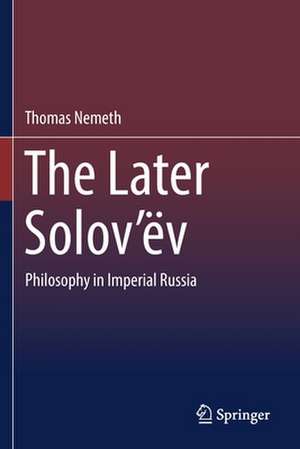The Later Solov’ëv: Philosophy in Imperial Russia
Autor Thomas Nemethen Limba Engleză Paperback – 14 aug 2020
The overall picture that emerges is of a much more vibrant and heated philosophical community than typically portrayed in Western secondary literature. The book ends with a reflection on the rise of Solov’ëv as a religious mystic at the expense of a critical evaluation of his thought.
| Toate formatele și edițiile | Preț | Express |
|---|---|---|
| Paperback (1) | 585.40 lei 6-8 săpt. | |
| Springer International Publishing – 14 aug 2020 | 585.40 lei 6-8 săpt. | |
| Hardback (1) | 591.79 lei 6-8 săpt. | |
| Springer International Publishing – 2 aug 2019 | 591.79 lei 6-8 săpt. |
Preț: 585.40 lei
Preț vechi: 688.71 lei
-15% Nou
Puncte Express: 878
Preț estimativ în valută:
112.03€ • 115.73$ • 93.24£
112.03€ • 115.73$ • 93.24£
Carte tipărită la comandă
Livrare economică 26 martie-09 aprilie
Preluare comenzi: 021 569.72.76
Specificații
ISBN-13: 9783030206130
ISBN-10: 3030206130
Pagini: 317
Ilustrații: VII, 317 p. 1 illus.
Dimensiuni: 155 x 235 mm
Greutate: 0.46 kg
Ediția:1st ed. 2019
Editura: Springer International Publishing
Colecția Springer
Locul publicării:Cham, Switzerland
ISBN-10: 3030206130
Pagini: 317
Ilustrații: VII, 317 p. 1 illus.
Dimensiuni: 155 x 235 mm
Greutate: 0.46 kg
Ediția:1st ed. 2019
Editura: Springer International Publishing
Colecția Springer
Locul publicării:Cham, Switzerland
Cuprins
Chapter 1. Introduction.- Chapter 2. A Philosophical Interregnum.- Chapter 3. On Free Will.- Chapter 4. A Perspective on the History of Philosophy.- Chapter 5. On Contemporaries and Contemporaneous Movements.- Chapter 6. Adumbrations of a Philosophical Aesthetics.- Chapter 7. The Start of the “Moral Philosophy” and Its Historical Context.- Chapter 8. Morality in History, Theory, and Practice.- Chapter 9. Morality vis-à-vis Law, Economics, and War.- Chapter 10. Critics Arise and Dismissed, Love Affirmed.- Chapter 11. The Final Philosophical Projects.- Chapter 12. Death and Legacy.
Notă biografică
The author of numerous publications on Russian philosophy, Thomas Nemeth has also translated Shpet’s 1914 treatise Appearance and Sense, Solov’ëv ’s Justification of the Moral Good, and Shpet’s Hermeneutics and Its Problems. He has also authored the comprehensive study Kant in Imperial Russia and published numerous articles on Russian and Italian philosophy. His Gramsci’s Philosophy: A Critical Study contrasted the Italian Marxist’s historicism against Crocean idealism and Husserlian phenomenology. After obtaining his PhD in philosophy from the University of Louvain, Nemeth held post-doctoral fellowships in Germany and Australia and was recently a Writer-in-Residence at NYU’s Jordan Center for the Advanced Study of Russia.
Textul de pe ultima copertă
This volume offers a critical examination of the later philosophical views of Vladimir Solov’ëv, arguably Russia’s most famous and most systematic philosopher. It offers a philosophically informed approach to this pivotal figure and to his era. Inside, readers will discover a detailed portrait of the often overlooked evolution of the philosopher’s views during the final two decades of his life. The author explores Solov’ëv’s still evolving aesthetic philosophy and his entry into the lively Russian discussion of free will. The work then turns to the philosopher’s mature statements on many figures from within the history of philosophy. This includes Kant and Hegel. Next, readers will learn about his disagreements with several contemporaries as well as contemporaneous movements. These include positivism and materialism. In addition, the coverage includes an elucidation and examination of Solov’ëv’s final expression of his ethical philosophy as set forth in his major ethical treatise Justification of the Moral Good.
The overall picture that emerges is of a much more vibrant and heated philosophical community than typically portrayed in Western secondary literature. The book ends with a reflection on the rise of Solov’ëv as a religious mystic at the expense of a critical evaluation of his thought.
The overall picture that emerges is of a much more vibrant and heated philosophical community than typically portrayed in Western secondary literature. The book ends with a reflection on the rise of Solov’ëv as a religious mystic at the expense of a critical evaluation of his thought.
Caracteristici
Presents a rare picture of the non-Marxist philosophical climate in 19th century Russia Details Solov’ëv’s confrontation with his philosophical opponents Offers a look into a vibrant and heated philosophical community
